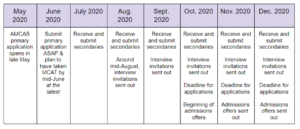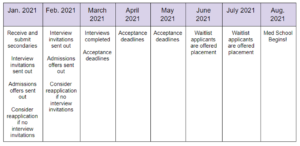By: Alessandra Santiago
For many pre-med students awaiting admission determinations from their medical schools, there can come a point where reapplying becomes a reality. But when do you know for certain that you’ll need to reapply?
The critical factor for students deciding their reapplication strategy is whether or not they have received any interview invitations by February of the year following they submit their primary apps. Typically, students who have not received any interview invitations by January or February (at the latest) should begin to consider their reapplying strategy.

There are myriad reasons why your application may have been unsuccessful. Your MCAT score may have been low; your GPA metrics may have not met the cut-off; you may have applied to research-heavy schools, and you had minimal research experience; you may have received an interview request, but stumbled in the actual interview.
The list goes on, but the point remains: if you decide to reapply, you must determine the weak points of your application and do what you can to improve those areas. Recruit a friend, trusted advisor, or professional colleague to review your application with you, or solicit feedback from the admissions representatives at the schools to which you applied to determine what your weak points were.
It may have been something as obvious as your GPA falling below the median GPA of matriculated students at your target schools. In this case, it may be wise to defer applying to schools for a year (or more) until you have bolstered your GPA through a post-bacc or Masters program. The key to succeeding with this strategy is time: you want to demonstrate that, through the duration of a year or more that you spend in a post-bacc, you improved your study strategies and became a stronger academic candidate.
If your weak point was your MCAT score, then consider how you will alter your study strategy and when you will retake the test. You want to show significant improvement between your initial and second scores. Let’s say you scored a 504, and the median score of your target schools was 512. You want to demonstrate a large upward improvement — aim to score an additional eight points or more to meet or surpass the median. This will take time and effort. Perhaps there are more full-length practice tests in your future. Or, maybe you will take an upper division biology course through a post-bacc to bolster your understanding of the testable material. Think about how you will address this shortcoming.

If your extracurricular sections are lacking, consider taking the time to zero in on those activities that will bolster your credentials and improve your primary application. You want to provide a compelling argument to admissions committees that you have had sufficient experience to understand the field of healthcare and, for some schools, medical research. Select activities that will narrow in your unique interests in medicine. Following your passions will allow you to communicate more clearly about why you are interested in medicine.
If your weak point was your Personal Statement, then edit it! It can help to do this after you have studied more or had more extracurricular experiences under your belt so that you have more fodder to work with. You may also want to take the time to consider whether or not you have selected the strongest possible letter of recommendation writers for your reapplication cycle.
Finally, if you received an interview request and have not heard from any of your schools by April or May of the year following the submission of your primary application, you may have stumbled somewhere in the interview. We will cover interview etiquette and avoiding committing an interview faux pas in a future article, but for now, making it all the way to the interview phase but failing to receive an acceptance means that you need more practice with med school interviews. Contact your pre-med advisors to see what interview coaching you might be able to do through your school.
Above all else, don’t rush into reapplying. The strongest re-applicants are the ones who take the time to reflect and dedicate themselves for months or years to bolster their credentials. If you are considering reapplying, take the time to think about how you can best demonstrate your commitment to medicine.
| Assignment #15: Consider your reapplication strategy (just in case). If you have not yet applied, take the time to solicit feedback on your application: are you the strongest possible applicant you can be? Review your academic metrics with your target schools through the MSAR directory. Receive outside feedback on your primary app/secondaries. Continue volunteering, doing research, and excelling in your coursework. |
If you want to learn more about navigating the Pre-Med journey, check out our Getting Into Med School: Tips and Tricks Blog.
